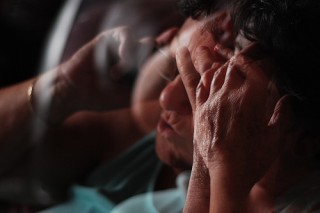by Camillo Mac Bica

If I ever think my life significant enough to document it in an autobiography, this will be the first paragraph. This recollection “emerged” from a discussion I had with friends about animal rights, but for me, it went well beyond the killing of a rat.
Years ago when I lived in Brooklyn, New York, whenever there was construction going on nearby, rats would inevitably find their way into my house, big ones, so big in fact, that one dragged away an entire sleeve of Oreo cookies from out of the box. Incensed at having to share my cherished snack with rodents, I set a rat trap, the kill kind. Not long afterwards, in the middle of the night I heard the trap snap. Unfortunately for me (and I’m sure for the rat) it did not die immediately.
So for the remainder of the night as I listened to it scream in pain until it finally died hours later, I was transported to another place and time, a time of killing to survive and of listening helpless as comrades died. Rats, I learned, like human beings, do not die quickly, quietly, and peacefully. As I covered my ears hoping to muffle the pitiful cries, I wondered, perhaps irrationally, if they too scream for their mothers, implore god to let them live, then plead for death to end their suffering. I wondered whether the rat would be missed by others, family members, offspring perhaps, who were anxiously awaiting its return. After that, I disposed of the kill traps and acquired the capture variety instead. Those rats I subsequently caught I would release in the cemetery down the block. Though I had not made the connection before, as I look back, I think it was at that point when I lost my desire for Oreo cookies. A lot to do penance for, I guess

Camillo Mac Bica, Ph.D., is a professor of philosophy and ethics at the School of Visual Arts in New York City. His philosophical focus is in Applied Ethics, particularly the relation between war, morality, and healing. Dr. Bica is a former the United States Marine Corps Officer and veteran of the Vietnam War. He is a long-time activist for peace and justice, a member of the Vietnam Veterans Against the War, and Coordinator of the Long Island Chapter of Veterans for Peace. Dr. Bica serves on the National Advisory Board of the “Soul Repair” Center, a research and educational center whose primary mission is to the further understand and treatment of Moral Injury experienced by soldiers returning from war. In addition to his two books “Worthy of Gratitude: Why Veterans May Not Want to be Thanked For Their “Service” in War;“ and “Beyond PTSD: The Moral Casualties of War,” articles by Dr. Bica have been published in numerous philosophical journals and online alternative news sites.
ATTENTION READERS
We See The World From All Sides and Want YOU To Be Fully InformedIn fact, intentional disinformation is a disgraceful scourge in media today. So to assuage any possible errant incorrect information posted herein, we strongly encourage you to seek corroboration from other non-VT sources before forming an educated opinion.
About VT - Policies & Disclosures - Comment Policy




